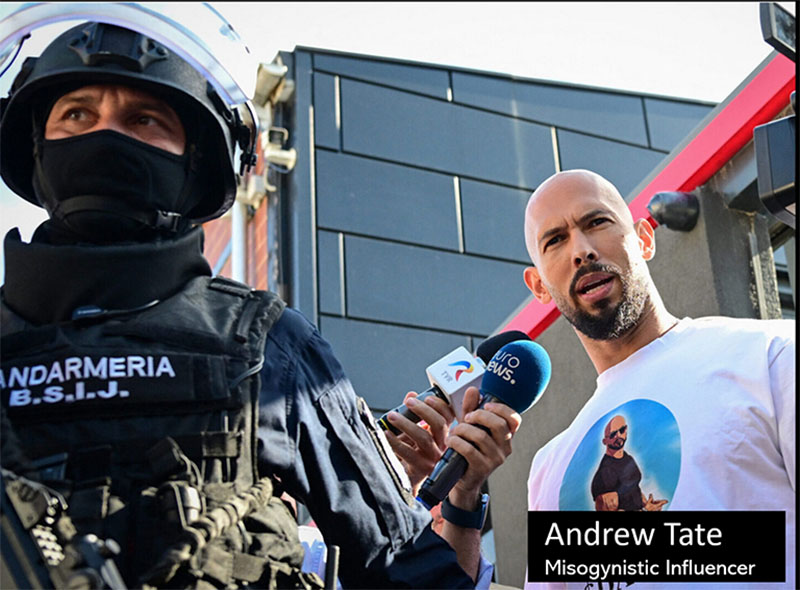Дело братьев Тейт: Мизогинисты-инфлюенсеры использовали офшорные счета для отмывания доходов от сексуальной эксплуатации!


Новые доказательства свидетельствуют о том, что влиятельный человек Эндрю Тейт и его брат Тристан Тейт использовали офшорные счета, включая Paxum Bank, для сокрытия доходов от своего скандального бизнеса по продаже веб-камер.
Тейтам предъявлены серьезные обвинения, включая торговлю людьми, сексуальную эксплуатацию несовершеннолетних и отмывание денег. Это дело подчеркивает необходимость надежной практики AML/KYC, особенно для платежных систем, работающих в секторах с высоким уровнем риска, таких как развлечения для взрослых.
Ключевые моменты:
- Братья Тейтс: 37-летнего Эндрю Тейта называют женоненавистником, гипермужественным, ультрароскошным авторитетом, который тесно сотрудничает со своим младшим братом Тристаном Тейтом, 35 лет. Оба имеют двойное гражданство США и Великобритании и в прошлом были профессиональными кикбоксерами.
- Обвинения: Эндрю и Тристану Тейтам предъявлены обвинения в торговле людьми, отмывании денег и организованной преступности, в том числе в торговле несовершеннолетними. В последних обвинениях перечислены 35 жертв, а Эндрю Тейт обвиняется в торговле несовершеннолетней с целью сексуальной эксплуатации и в сексуальных отношениях с другой несовершеннолетней. Его также обвиняют в запугивании свидетелей.
- Действия правоохранительных органов: Румынская полиция провела обыски в домах братьев, что привело к их аресту и изъятию роскошных активов. Румынский судья поместил Тристана Тейта под залог, а Эндрю Тейта — под домашний арест до дальнейших досудебных слушаний.
- Улики: Данные прослушки свидетельствуют о том, что Тейты использовали несколько банков и оффшорных счетов, включая Paxum Bank, для сокрытия доходов от своего бизнеса по продаже веб-камер.
Раздел повествования:
Эндрю Тейт и Тристан Тейт, печально известные в социальных сетях, оказались в центре сложного уголовного дела, связанного с торговлей людьми, отмыванием денег и организованной преступностью. Тейты отрицают свою вину, но улики против них продолжают накапливаться. Румынские прокуроры перечислили 35 жертв, обвинив братьев в эксплуатации женщин через свой веб-камерный бизнес и запугивании свидетелей.
Одним из ключевых элементов этого дела является использование Тейтами оффшорных счетов для сокрытия миллионов долларов прибыли от их деятельности в сфере развлечений для взрослых. Недавний отчет ICIJ показал, что Тристан Тейт держал счет в Paxum Bank, финансовом учреждении, известном тем, что обслуживает индустрию развлечений для взрослых. С этого счета Тристан получил более 2,6 миллиона долларов в виде платежей от веб-кам-платформы для взрослых.
Хотя Paxum Bank отрицает, что у Тейтов были счета в нем, расследование ICIJ обнаружило электронные переводы из Paxum Bank в другие европейские банки, что вызывает опасения относительно финансовых маневров Тейтов. Предположительно, братья распределяли свои доходы по нескольким счетам, чтобы обойти меры по борьбе с отмыванием денег (AML).
Полезная информация:
Платежные процессоры, особенно те, которые работают в секторах с высоким уровнем риска, таких как развлечения для взрослых, должны постоянно поддерживать обширные протоколы AML и KYC (Know Your Customer). Неспособность должным образом контролировать клиентов может подвергнуть платежные платформы значительным рискам, включая содействие отмыванию денег или создание условий для деятельности преступных сообществ. В случаях, когда речь идет о продавцах из секторов с высоким уровнем риска, регулярные аудиты, мониторинг транзакций и повышенный уровень должной осмотрительности имеют решающее значение для своевременного выявления и сообщения о незаконной деятельности.
Дело компании Tate демонстрирует, как плохое соблюдение требований AML может позволить преступным операциям процветать незамеченными. Используя несколько банковских счетов и такие платформы, как Paxum, Тейты, предположительно, скрывали свои доходы, занимаясь незаконной деятельностью. Платежные процессоры и финансовые учреждения должны играть активную роль в выявлении и пресечении подозрительных действий до того, как они перерастут в полномасштабные преступные предприятия.
Recent Posts
Сбежавший в Швейцарию блогер Станислав Домбровский просит прощения у украинцев
Одесский трэш блогер Стас Домбровский, который в последнее время проживает в Швейцарии, записал видеообращение к…
Александра Устинова и атака на руководство АОЗ: что стоит за волной критики
Александра Устинова, народная депутат, которая в последние дни активно атакует Агентство оборонных закупок (АОЗ) возможно…
Журналисты показали имение киевской судьи, закрывшей дело Приходько
Свобода "под ключ" или манипуляция правосудием? Борис Приходько – нацбанкир времен Януковича и действующий нардеп…
Судьи вне закона
В течение последних трех лет внимание общественности если и бывает приковано к судам, то гораздо…
Артем Ляшанов и bill_line спасают репутацию через суд
Финтех-компания столкнулась с обвинениями в отмывании денег игорной мафии. ООО «Тех-Софт Атлас» (ТМ «bill_line») и…
Криптобиржа WhiteBIT: как Владимир Носов и «регионалы» Шенцевы отмывают деньги и помогают спецслужбам России
Владимир Носов в Украине пытается позиционировать себя как респектабельный бизнесмен и хозяин криптобиржи WhiteBIT. Однако…

